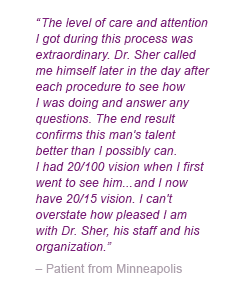| Most people don’t like wearing glasses or contacts to correct their vision, and those feelings can intensify in the summer for many reasons:
1. Glasses can interfere with your summer sports and activities, such as swimming, biking and golf.
2. The choices for sunglasses are not only limited, but expensive for people who need prescription lenses.
3. Glasses can be very hot to wear and can slip down on the face when sweaty.
4. Contact lens wearers have issues with dust, pollen and allergies that make contact lens wearing sometimes difficult in the summer.
No matter which of these problems you experience, laser vision correction may be an alternative that could make you less dependent or eliminate the need for glasses or contacts.
As a leading expert in laser vision correction and refractive surgery, Neal A Sher MD, FACS of Eye Care Associates has over two decades of experience in helping patients to eliminate or reduce their need for the contacts and eyeglasses they use for nearsightedness, farsightedness or astigmatism.
Dr. Sher utilizes the most advanced laser vision and refractive surgery techniques. In less than 15 minutes, he can gently alter the shape of the cornea to improve uncorrected vision. PRK (photorefractive keratectomy) is highly effective; so much so that after their procedures the overwhelming majority of his patients no longer need contacts or eye glasses for distance vision.
CLICK HERE TO READ MORE
CLICK HERE TO SCHEDULE AN APPOINTMENT
CLICK HERE TO READ MORE ABOUT DR. SHER’S EXPERIENCE AND THE PRK PROCEDURE
Winter Weather Tips for Your Eyes
Here are five tips to keep your eyes healthy and comfortable all winter:
1. Wear sunglasses with lenses that block 99 to 100 percent of UVA and UVB rays. When the sun bounces off snow and ice, it creates a very bright environment that can damage the corneas (snow blindness) and may, in the long term, be harmful to the internal structures of the eye including the lens and retina.
2. Purchase polycarbonate goggles to protect your eyes from glare and block cold, drying wind.
3. Because indoor heating can suck moisture from the air, if you have dry eye symptoms, consider using artificial tears to keep your eyes and contacts lubricated.
4. Stay hydrated by sipping a beverage but avoid alcohol, which can actually dehydrate eyes.
5. To combat dry indoor air, use a humidifier in your bedroom to help reintroduce moisture into the air, and lessen eye irritation.
|



